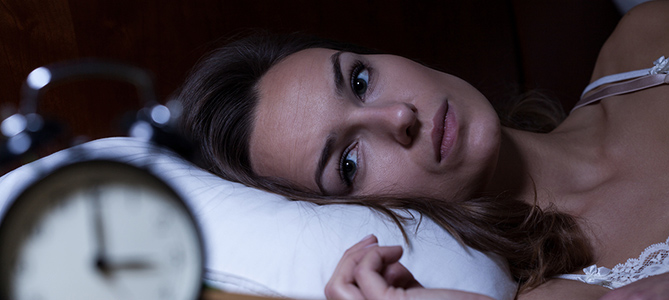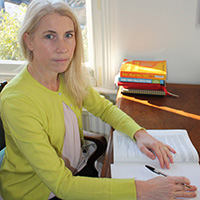
Dr Laura Quinton, GP and CNM Graduate in Naturopathic Nutrition, shares her personal experience of coming to realise the link between insomnia and nutrition.
Not only do I see a lot of patients in my surgery suffering with poor sleep but I also suffered with insomnia myself for years. Things changed for me when I learnt about nutrition and functional medicine with CNM. My sleep improved and I felt a whole lot healthier.

Poor sleep is associated with many aspects of ill health and disease. It is associated with heart disease, poor immunity and insulin resistance. It also affects your life and you can get stuck in a rut and make poor lifestyle choices. You might be too tired to exercise. You reach for comfort food to give yourself a boost because you just feel too tired to cook from fresh. These habits keep you in a poor sleep-exhaustion cycle.

When I was a junior doctor working shifts my diet was terrible. I remember doing an attachment in obstetrics where every third night I was on call for Labour ward. This could involve a sudden call to the birth of a baby. I had to be alert and ready to help. I survived by making coffee or tea laced with sugar and endless rounds of toast in the labour ward kitchen. I would spoon jam on the thick white processed bread and get through another shift. Sometimes there would be a takeaway. When I managed to get to the hospital canteen I was faced with a variety of yellow foods. I remember it vividly. I was absolutely exhausted. It set me up for years of insomnia. A poor diet just fuelled it all along. There was never any time I looked at what I was eating to improve things.

I was a doctor who along with my colleagues understood next to nothing about the impact of nutrition on health because it had never been a significant part of our training. I thought that the stress and lifestyle itself were the driving forces behind insomnia.
Everyone gets stress and it can be a good thing as well as a bad thing. Being a GP in practice also posed similar stressful long days. I generally ate at my desk or at meetings and grabbed whatever food was quickest and easiest to tide me over to the afternoon and evening. My standard lunch was shop bought sandwiches, crisps and a diet drink. I am embarrassed now to say I thought this was a healthy choice. As a Nutrition student at CNM, I learnt that it wasn’t. Combining work with family just added to making me grab food on the go. I was suffering badly from insomnia. I thought I was just suffering from stress. I remember spending time lying awake at night listening to various podcasts for relaxation. I tried getting up and watching night-time telly. I would lie there for hours and end up getting more and more worried about my alarm going off and having to start another day. The sad thing was that I never once thought about my diet.

Sleep Hygiene
Fast forward to my discovery of nutrition and functional medicine. As well as being taught about sleep hygiene I also discovered the effect of diet on sleep. Sleep hygiene involves stopping the use of electronics a couple of hours before bed, making sure the room you sleep in is warm but not hot, and keeping your bedroom well ventilated. Keeping lights as low as possible and making sure the room is as quiet and dark as you can make it, helps. Use aromatherapy oils such as lavender and chamomile in the room and in warm baths. Use all of the senses to help relaxation.
Sugar
Then there is food. Sugar rushes and carb cravings send your blood sugar up and down. This rollercoaster of blood sugar all day does not help relaxation even though it might feel like a quick fix at the time to raise energy. Understanding this was the key to me curing my insomnia. A stable blood sugar through the day can certainly help. Swapping out processed carbs like white bread and pasta to whole grain brown and wild rice can help.

Starting the day well on porridge oats made with water with a few nuts and berries can keep your blood sugar on track from first thing in the morning. I started batch cooking and taking in my own homemade soup for lunch instead of relying on shop bought sandwiches and crisps. At first, I craved the junk for the energy rush but it did not take very long for my taste buds to change and my energy levels to improve. Getting rid of diet drinks and the chemicals they contain made me feel a whole lot less ‘wired’. This then had a positive impact on my sleep.

I also discovered that I was low in magnesium. This is essential for muscle relaxation and can help you wind down. I started making sure I upped my leafy green vegetables by eating a portion a day to get fibre to sustain my blood sugar and to get my fix of magnesium. In the beginning I took a magnesium supplement too. Magnesium can be depleted by alcohol, low levels of vegetables in the diet and a busy lifestyle. It is now thought that up to 80% of people living in the UK may have suboptimal levels of magnesium and it can certainly contribute to insomnia. Because most magnesium is in your body cells there is no actual blood test to see if you are low, but there is functional testing. When I was a student at CNM one of the nutritionists gave me a bedtime smoothie recipe which included cherries. Cherries can boost your body with melatonin, the hormone that regulates the sleep–wake cycle. I also tried some Ayurvedic medicine and added a teaspoon of powdered Ashwagandha to my smoothie.
“I have absolutely no doubt that it was the changes to my diet that cured my sleep problems. I still have the busy lifestyle and the stress. Having a good night’s sleep helps me to take it all a lot more in my stride and I feel a whole lot better! I’ve seen improvements in my blood pressure too. Food really is the best medicine for sleep, backed up by sleep ‘hygiene’ as mentioned above.”
As a CNM Graduate in Naturopathic Nutrition, I studied health from a functional medicine perspective. I learnt about food, micronutrients and phytochemicals. I read up and wrote assignments on gut health and its intrinsic relationship to our immune and nervous systems. It was fascinating and gave me a fresh new insight into my patients’ problems as a GP. I have learnt so much that no medical textbook has ever taught me. I have improved my own health and well-being enormously. Adopting a functional medicine approach has reignited my passion in being a doctor. My own belief is that food is the key to many health issues that I see daily in my surgery.
In my opinion, the future of medicine is nutrition, preferably from a naturopathic angle which addresses the triggers, and empowers the patient to take more responsibility for improving their health.
Dr Laura Quinton can be contacted via www.drlauraquinton.com


